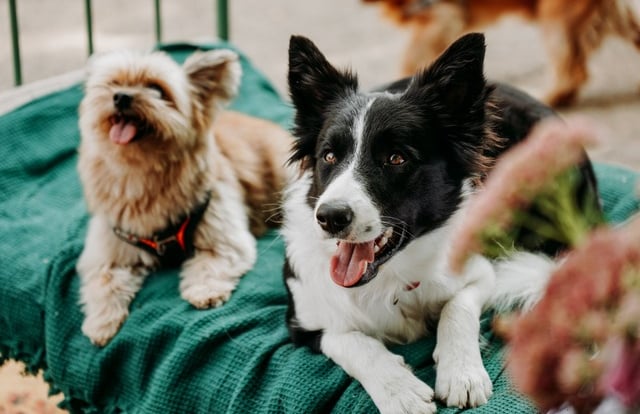A Guide to the 10 Best and Worst Foods for Dogs
HEALTHY PETS


Hey there, dog lovers! Ever found yourself sharing a snack with your pup and wondered, "Is this actually okay for them?" If so, you're not alone. Many foods we enjoy can be either a healthy treat or a serious health risk for our four-legged family members. Understanding which foods fall into each category can help keep your dog healthy and happy.
What do we mean by "good health" for dogs?
It's all about what's happening on the inside. A healthy dog can properly break down food, absorb nutrients, and support their immune system. What they eat is the primary fuel for their energy, so giving them the right foods is one of the best ways to help them live a long and healthy life.
Before we dive into the world of canine foods, here's a general rule of thumb to remember:
Size of the food matters. If your dog has difficulty swallowing, it's always best to break food into smaller, bite-sized pieces. Always stick to whole, natural foods. Avoid products that contain xylitol an artificial sweetener that is highly toxic to dogs. Ensure your furry friend gets all the carbs, protein, and nutrients they need.
If your dog doesn't like veggies, try blending them and making cute pupsicle treats. You can also use slow-feeding puzzle bowls or toys that allow your dog to eat healthy foods in a fun, new way. When in doubt, always consult your local vet!
5 Best Foods for Dogs
Get ready to learn how to make smarter choices for your dog’s diet and contribute to their long, happy life. Let's dive into the world of dog-safe foods.
Apples:
A crunchy, low-calorie treat! Apples are a great source of fibre and vitamins A and C, which are excellent for your dog’s digestive and immune systems. Just remember to remove the core and seeds, as they contain a small amount of cyanide. And remember, just because dogs love apples doesn't mean they can eat apple pie. The sugar in pie is too much for dogs and can cause gastrointestinal distress. The simplest way to prepare apples for your dog is to either cut them into small cubes or air fry them at 200 degrees Fahrenheit for two hours until completely crispy. You can also opt for dog treats that contain apples as an ingredient.
Blueberries:
Tiny but mighty, these antioxidant powerhouses can help reduce inflammation and protect your dog’s cells from damage. You can give them to your pup fresh or frozen. Even though blueberries are small, they can pose a choking risk, especially for small dogs. Remember, all treats should make up no more than 10% of your dog’s daily diet.
Peanut Butter:
A classic favorite! Peanut butter is a great source of protein and is perfect for hiding pills or as a reward in a puzzle toy. A word of caution: Always choose plain, unsalted peanut butter that doesn't contain xylitol, a sweetener that is highly toxic to dogs and can cause a rapid drop in blood sugar and liver failure.
Cucumbers:
Green veggies like cucumbers green beans, and zucchini are great because they are low in calories and especially good for pets that need to lose weight. Cucumbers are high in vitamins B, C, and K, as well as potassium and magnesium. They are also 96% water, making them a healthy, hydrating summer treat. Cut the cucumber into small pieces to avoid choking. Some vets also advise peeling the skin.
Bananas:
Bananas are a favourite dog treat, especially for older dogs with sensitive teeth since they are easy to chew. Bananas are rich in fiber, B vitamins, and potassium, all of which support a dog's overall health.
5 Dangerous Foods to Avoid
Some foods can be extremely harmful to your dog, even in small amounts. Keep these far away from your pet.
Nuts:
Giving nuts to dogs is not a good idea. But if they consume one or two, they likely won't need to go to the vet. Just monitor them for choking, stomach upset, vomiting, diarrhea, or a loss of appetite. However, macadamia nuts, pistachios, almonds, and cashews can be toxic to dogs and cause stomach upset.
Bones:
You may have heard that giving your dog cooked bones is unsafe, but many vets believe that all bones pose a risk to dogs, whether they are cooked or uncooked. Dogs chewing on bones can cause several injuries and illnesses, including broken teeth, digestive tract blockages, injuries to the stomach and intestines, and internal bleeding. There are many safe chew bones on the market for dogs. Ask your vet for a recommendation rather than risking an emergency visit.
Grapes and Raisins:
This is a big one. Grapes and raisins are known to cause severe kidney failure in dogs. Even one or two can be enough to cause a problem.
Chocolate:
Most people know this one, but it's still worth repeating. Chocolate contains theobromine and caffeine, which dogs can't metabolise. This can lead to vomiting, diarrhoea, an increased heart rate, and even death in some cases. The darker the chocolate, the more dangerous it is.
Onions and Garlic:
These are part of the allium family and are highly toxic to dogs. They can damage a dog’s red blood cells, leading to anemia. Be careful with seasoned foods, sauces, or gravies that might contain onion or garlic powder.
When it comes to your dog’s diet, you’ve got this! By knowing which human foods are good for them and which ones are dangerous, you can make smart, loving choices that keep your best friend happy and healthy. Always remember to introduce new foods slowly and don't hesitate to give your vet a call if you have any questions they’re there to help!
